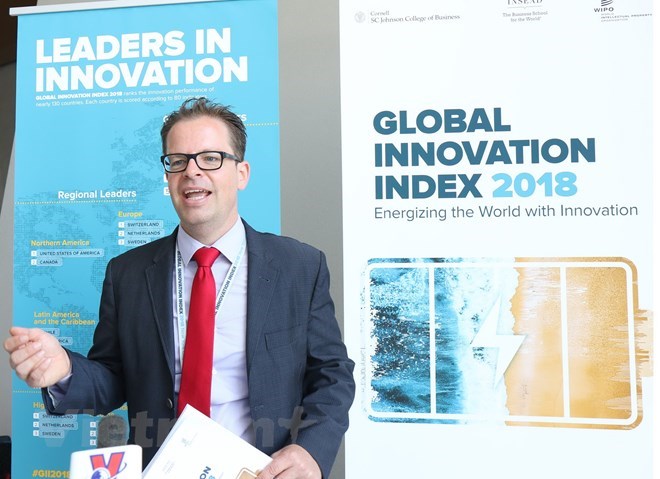[ad_1]

Vietnam improved its position in the GII, ranking 45th among 126 economies in the world, climbing two places compared to last year.
Among 30 low middle-income countries, Vietnam ranked second after Ukraine, according to the report.
In an interview with US-based Vietnam News Agency’s correspondents on the sidelines of the announcing ceremony of the report, Sacha Wunsch-Vincent, a senior expert in the WIPO’s GII research group, said in the most recent edition of the GII, Vietnam emerged as a country with a special effect on innovation.
It became a model of technological innovation for the group of low middle-income countries, he noted.
According to Wunsch-Vincent, Vietnam is the only country that has directions from the prime minister level with a resolution on setting up a special group to bring together ministries and sectors to improve the country’s position in the global innovation rankings.
He noted some economies are making a serious mistake if they don’t pursue a continual innovation agenda and recommended Vietnam to avoid this blunder and pursue policies and plans set forth by Prime Minister Nguyen Xuan Phuc to promote innovation.
Vietnam should not make another mistake in many countries to set goals as great as building Silicon Valley, he added.
The country should focus on its existing internal strengths, such as in food production and processing and information technology, considering ways to increase the country’s own innovation capacity along with accessing new external technologies, he said.
Le Thanh Binh, Science and Technology Counsellor of the Vietnam Permanent Mission to the United Nations, highlighted the improvement of Vietnam’s position in the GII 2018, noting that the country climbed 14 places compared with 2016, and recorded higher scores in all seven pillars of the GII.
The effectiveness of Vietnam’s reform efforts were reflected in both input and output indicators and Vietnam’s position in the GII rankings has improved in every aspect in the last five years, he added.
This year, Switzerland is the world’s most innovative nation, followed by Netherlands, Sweden, the UK, Singapore, the US, Denmark, Germany and Ireland.
In the top 20 of the GII 2018, Israel and China recorded leaps. Israel climbed seven places to rank 11th and China jumped five places to the 17th position.
This is the 11th consecutive year the GII Report has been released. It aims to capture the multi-dimensional facets of innovation by providing a database of metrics for economies worldwide.
The GII 2018 is divided into seven pillars. Of which, the first five pillars are in the group of innovation input sub-indices, including institutions, human capital and research, infrastructure, market sophistication and business sophistication. The last two pillars are the group of innovation output sub-indices, including knowledge and technology outputs and creative outputs.
Themed “Energizing the World with Innovation”, the GII 2018 is the result of collaboration between Cornell University, INSEAD and the WIPO as co-publishers.
The GII Report 2018 analyses the energy innovation landscape of the next decade and identifies possible breakthroughs in fields such as energy production, storage, distribution and consumption. It also looks at how breakthrough innovation occurs at the grassroots level and describes how small-scale renewable systems are on the rise.
The report concludes that by 2040, the world’s energy demand is expected to grow substantially by 30 percent, while conventional approaches to expand energy supplies are no longer feasible in the context of climate change.
VNA
[ad_2]
Source link
